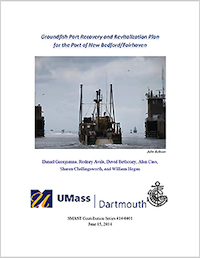The New England Fishery Management Council and the city of New Bedford both had Magnuson-Stevens Act reauthorization on their minds this week.
The council is meeting here in Portland, Maine, this week, and Tuesday afternoon, they heard Tom Nies, the council's executive director, deliver a briefing on the Senate draft version of legislation to reauthorize the nation's fishing law. The Senate version differs from the House version, H.R. 4742; Nies noted that the Senate draft version doesn't address many of the issues that the council has identified as important, such as providing greater flexibility to the act's stock rebuilding time limits.
Council member David Pierce, deputy director of the Massachusetts Division of Marine Fisheries, added that the draft version didn't address any of the National Research Council's comments on improving fisheries management, which he said would go a long ways toward fixing problems with the law.
"Congress can benefit from the comments by renowned scientists, which should be embraced," he said.
"I see this document increasing complexities," added at-large council member Mike Sissenwine. "It would be a real challenge for the agency to work up guidelines."
While Nies noted that an updated version of the Senate draft should be coming forth soon, council members agreed it was important to submit comments on the present version addressing general concerns the council has, such as a lack of clarity and inconsistencies in draft provisions, and encourage the senate to include the research council's recommendations.
"It's important to note what's been omitted and restate our hopes for the original bill," said council member Laura Ramsden of MF Foley Co. in New Bedford, Mass.
 Meanwhile, that very afternoon New Bedford, one of the nation's oldest and most prestigious fishing ports, released a plan that its harbor commission has developed to revitalize its groundfish industry and the port.
Meanwhile, that very afternoon New Bedford, one of the nation's oldest and most prestigious fishing ports, released a plan that its harbor commission has developed to revitalize its groundfish industry and the port.
It makes for fascinating reading. The harbor commission has really thoroughly documented the decline the port's groundfish fleet has experienced in recent years, and the effect that decline has had on related businesses and the community.
It's also developed a six-point plan for turning the groundfish fleet's fortunes around. At the top of the list is improving groundfish stock assessments via the expanded use of video survey technology developed through the University of Massachusetts School for Marine Science and Technology.
The video surveys are patterned after the same techniques used to revolutionize scallop surveys more than a decade ago. Thanks to those surveys, the thriving scallop fishery accounts for 85 percent of the port's landings today.
The plan also sets forth recommendations for reforming the Magnuson-Stevens Act. It advocates clarifying the act's National Standards and reducing their total number from 10 to five.
It also calls for maximizing yield within constraints set by regulations; basing conservation goals on the scientific data that would be derived from collaborative research between the government, fishermen and marine scientists; minimizing bycatch; considering fisheries' respectively unique distinctions when setting management goals; minimizing costs; and considering efficiency when allocating resources, including noneconomic considerations.
Moreover, the plan recommends changing how fisheries are managed, clearly defining NOAA's role in fisheries management and establishing ways to measure the performance of fisheries management plans. It, too, recommends relaxing the 10-year stock rebuilding requirement, plus increasing cooperative research efforts and creating new scientific working groups as a means of improving the review process.
It's interesting to see how the region's managers, fishermen and ports are weighing in as the Magnuson reauthorization process rolls on. At this point, given that election season is looming, it appears unlikely that Congress will churn out an amended Magnuson-Stevens Act by year's end.
Clearly views on Magnuson differ among fishermen, depending on what region they hail from, and they differ on Capitol Hill between the House and the Senate. But it's also clear that in New England, where groundfishermen and the communities that depend on them are struggling to hold on, an amended Magnuson-Stevens Act can't come too soon.







